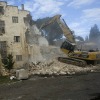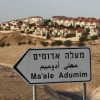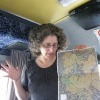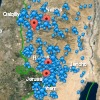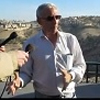Some Hard Truths about Jerusalem…
- Jerusalem is of central importance to Israelis and Jews everywhere. It is a city that throughout history has been the focal point of Jewish collective yearning and collective identity. The Jewish return to the Old City and its holy sites after 1967 was the fulfillment of this yearning. No one can deny or undermine the Jewish connection to Jerusalem. Jerusalem is and will forever be the capital of Israel.
- Jerusalem is also a city that has deep political, historical, economic, and cultural significance to Palestinians, and deep religious importance not only for Jews, but for Christians and Muslims everywhere.
- Jerusalem is already a divided city. One-third of its population is Palestinian, in addition to large Palestinian urban areas lying just beyond the municipal border. The patterns of life in the city disclose two distinct populations - Israelis and Palestinians - living separate and rarely overlapping existences.
- Jerusalem must be re-fashioned as two capitals for two states. No resolution to the Israeli-Palestinian or Israel-Arab conflicts is possible without compromise on Jerusalem. Refusal to negotiate in good faith over the future of Jerusalem will mean the loss of the two-state solution. Settlements in East Jerusalem are and have always been about only one thing: cementing Israel’s hold on the land in order to prevent the emergence of a Palestinian capital in the city. After 47 years, a two-state solution is still possible in Jerusalem, but barely.
- If political obstinacy and extremism are allowed to stand in the way of compromise, or if settlement-related developments continue and succeed in taking Jerusalem off the negotiating table, it will mean the end of the two-state solution. Loss of the two-state solution directly threatens Israel’s viability as a democracy and a Jewish state.
- The current borders of Jerusalem have no historical or religious meaning. Shortly after the 1967 War, Israel annexed large areas of land, including a number of Arab towns and villages, to expand Jerusalem. There is nothing sacred about these borders, either to Israel or to Jews. The emergence of a Palestinian capital in Arab areas of Jerusalem, along with a special regime or special arrangements for the Old City and its surrounding area – would not undermine Israel's claim to Jerusalem as its capital. Rather, it would clear the way for international recognition of Jewish Jerusalem as Israel's capital.
- For the sake of Israel's security and stability – and for the health and stability of this remarkable city – a formula must be found to share Jerusalem between Israelis and Palestinians, and between Jews, Muslims, and Christians. Pragmatic, creative solutions exist to satisfy competing claims to Jerusalem and its holy sites; what is needed is the leadership, courage, and goodwill to explore them. Most of the proposed solutions for Jerusalem's future would put Arab neighborhoods under Palestinian control, while Jewish neighborhoods would remain under Israeli control. These arrangements would make Israel's capital a more Jewish city and would allow Israel to shed the burden of ruling over Palestinians, while guaranteeing Jewish access to holy sites.
Don't miss our briefing call with Jerusalem expert Danny Seidemann or with Daniel Seidemann and APN's Lara Friedman regarding the tension in Jerusalem in 2014.
Return to the Main "Jerusalem" Page
YOU can help reclaim Israel's future in Jerusalem. Here are actions you can take right now:
-
Spread the word. Two of the greatest obstacles to changing Israeli policies are apathy and ignorance.
Challenge both. Here are some easy ways:
- Don't miss Thursday's briefing call with Jerusalem expert Danny Seidemann, on Thursday, June 26th at 3:45pm Eastern Time. Details here.
- Share Facts on the Ground: APN’s Map App on Facebook and Twitter.
- Send your friends the Jerusalem chapter from APN’s landmark publication, “They Say, We Say”.
- Post and send out APN’s "Danny Seidemann: Why E-1 matters" video filmed last winter during APN's Israel Study Tour (below).
- Read and share APN's Top 10 Myths about Jerusalem from 2010 (sadly, little has changed).
Return to the Main "Jerusalem" Page
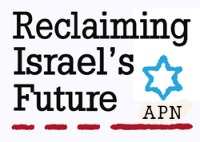
On the second week of our Reclaiming Israel’s
Future campaign, Mr. Seidemann will help us address the theme of the week: Jerusalem. He will discuss the
latest developments on the ground in East Jerusalem, examine the situation on the ground 47 years after the Six Day
War, and address the future of Jerusalem.
--Peace Now Secretary General reacts to government decision in wake of kidnapping to transfer millions of shekels to settlements without any designation of objectives.**
Israeli Prime Minister Benjamin Netanyahu is getting a raw deal. That’s the line being peddled by Elliot Abrams, who has emerged in recent months as one of the staunchest U.S. defenders of Netanyahu’s settlement policy. Rather than bury Netanyahu with criticism for expanding settlements, Abrams argue, the world should praise him for his unrecognized settlement restraint. The facts, Abrams insists, tell the story – facts that Abrams cherry-picks and spins to build a case that is pure fiction.
by APN's Summer Intern, Hannah Ehlers

This week’s Torah portion (Korach, Numbers 16:1-18:32) concerns the dangers of complacency and the unfairness of acting at the expense of others, matters relevant to events in Israel today. Korach leads a rebellion against Moses and Aaron. 250 followers join Korach to challenge the leadership of Moses and Aaron, demanding priesthood in addition to the “service of the tabernacle of God” (Numbers 16:9) to which they, as Levites, are already assigned. These actions by Korach and his cohorts, and the lack of opposition by the greater community, ultimately result in immense suffering—the earth swallows Korach and his men and a deadly plague spreads through the Israelite community.
God initially sought to destroy the entire community as punishment for Korach and his followers’ sins. But Moses and Aaron pleaded for fairness: “O God, Source of the spirit of all flesh! When one man sins, will You be wrathful with the whole community?” (Numbers 16:22). God relented and instructed the prophets to tell the Israelites to “depart… from the tents of these wicked men, and touch nothing of theirs, lest you be swept away in all their sins” (Numbers 16:26). Besides the 250 men with Korach, the rest of the community is largely uninvolved in the conflict between the rebels and the prophets. God views the community’s indifference as betrayal and demands that they act.
- Briefing call with Danny Seidemann and Lara Friedman regarding the tension in Jerusalem, October 31, 2014. Listen here.
- Briefing call with Jerusalem expert Danny Seidemann, June 26, 2014. Listen here.
- Download and use Facts on the Ground: APN’s Map App. Use this map to explore the data we have collected about settlement activity in the West Bank and check it regularly to see updates on settlement activity.
- Read and share the Jerusalem chapter from APN’s landmark publication, “They Say, We Say”.
- Watch APN’s "Danny Seidemann: Why E-1 matters" video filmed last winter during APN's Israel Study Tour (below).
- Read and share APN's Top 10 Myths about Jerusalem from 2010 (sadly, little has changed).
- Read and Share Articles from APN:
- Settlements in Focus: "Abusing Jerusalem to Assail Peace: the Case of the Shepherd's Hotel" (July 22, 2009)
- Settlements in Focus: Jerusalem Settlements take Center Stage" (Feb. 18, 2008)
- Settlements in Focus: "The Battle for Jerusalem's Old City and Holy Basin" (May 19, 2006)
- Settlements in Focus: "Greater Jerusalem at the Crossroads: Sharon's Impact, Olmert's Vision" (May 5, 2006)
- Settlements in Focus: Settlers vs. Palestinians: Double Standards and Illegal Construction (March 3, 2006)
- Settlements in Focus: Targeting the Old City's Muslim Quarter (Aug. 19, 2005)
- Settlements in Focus: "East Jerusalem Land Grab?" (June 24, 2005)
- Settlements in Focus: "E-1 & Ma'ale Adumim" (May 19, 2005)
- Jerusalem in the US Passport – Compilation of APN publications
[For the most recent news/analysis, see Latest Developments, co-authored by Lara Friedman & Danny Seidemann, March 2011-present]
- Lara Friedman & Danny Seidemann in Open Zion/the Daily Beast: Netanyahu Must Rein in Extremists in Coalition, or Risk Derailing Peace Talks (Aug. 28, 2013)
- Lara Friedman & Danny Seidemann in ForeignPolicy.com: Status Quo on the Temple Mount? (Oct. 17, 2012)
- APN Statement: APN Condemns Attack on DNC over Jerusalem (Sept. 5, 2012)
- Lara Friedman for APN: Another (Predictable) Jerusalem Settlement Announcement (Sept. 28, 2011)
- Lara Friedman & Danny Seidemann for APN: Throwing another East Jerusalem Wrench into the Works: Final Approval of Plan for Mughrabi Gate Ramp (Nov. 10, 2010)
- Lara Friedman & Danny Seidemann for APN:Netanyahu pushes East Jerusalem settlements (Nov. 8, 2010)
- Lara Friedman & Danny Seidemann for APN: Spotlight on the ongoing battle for East Jerusalem (Nov. 3, 2010)
- Lara Friedman for APN: A dangerous sea-change in Israeli policy toward Jerusalem (Aug. 16, 2010)
- Lara Friedman for APN: Ending the "business-as-usual" settlements era in East Jerusalem? (March 17, 2010)
- Lara Friedman & Danny Seidemann in ForeignPolicy.com: Jerusalem, Settlements, and the “Everybody Knows” Fallacy (Mar. 19, 2010)
- APN Statement: APN Responds to Wiesel Ad on Jerusalem (April 16, 2010)
- Lara Friedman & Danny Seidemann for APN: 50,000 new units for East Jerusalem - Behind the Headlines (March 11, 2010)
- APN Board member Jo-Ann Mort in “Dissent”: "Jerusalem: Going for the Gold" (Jan. 8, 2010)
- Lara Friedman for APN: A Chance to do the right thing on the Museum of Tolerance in Jerusalem (Jan. 15, 2010)
- Lara Friedman & Danny Seidemann for APN: Jerusalem Blitz (latest news and analysis) (Jan. 7, 2010)
- Lara Friedman for APN: Jerusalem settlement déjà vu (this time it's the Mt. of Olives) (Jan. 5, 2010)
- Lara Friedman & Danny Seidemann for APN: With New Tenders, Bibi Goes Nuclear on Jerusalem (Again) (Dec. 29, 2009)
- Lara Friedman & Danny Seidemann for APN: Bibi Goes Nuclear on Jerusalem Settlements (Nov. 17, 2009)
- Lara Friedman & Danny Seidemann in Haaretz: Flirting with the apocalypse (Oct. 9, 2009)
- Lara Friedman & Danny Seidemann for APN: Clear and Present Danger in Jerusalem (Oct. 5, 2009)
- Daniel Seidemann Special for APN: On Huckabee, the Settlers, and Jerusalem (August 17, 2009)
- Lara Friedman for APN: Mike Huckabee *hearts* East Jerusalem Settlers (Aug. 13, 2009)
- Lara Friedman for APN: Setting the Record Straight: Palestinians Can't Really Live in West Jerusalem (July 20, 2009)
- Danny Seidemann in the Forward: Loving Jerusalem, With Maturity (May 13, 2009)
- APN Letter to Simon Wiesenthal Center: Jerusalem Museum to be built on Muslim cemetery (Dec. 23, 2008)
- Daniel Seidemann in Newsweek/Washington Post: "Enough of the Jerusalem Mantra" (Sept. 10, 2008)
- Leibel Fein for APN: "Clear Ambiguity" - Olmert, Settlements, & East Jerusalem (Feb. 6, 2008)
- APN Statement: APN Applauds White House for Taking Up East Jerusalem Land Confiscation Issue (Feb. 1, 2005)
Return to the Main "Jerusalem" Page
1. Bills, Resolutions & Letters
2. House FY 15 ForOps – Mideast Elements
3. Senate FY15 ForOps – Mideast Elements
4. Hearings
5. Members on the Record
6. From the Press/Blogs
Of Special Note:
Lara Friedman op-ed 6/20: Facts on the Ground: Elliot Abrams’ Flawed Defense of Bibi’s Settlement Push
APN launches 6-week campaign: Reclaiming Israel’s future. This week the issue was settlements. Next week is Jerusalem.
